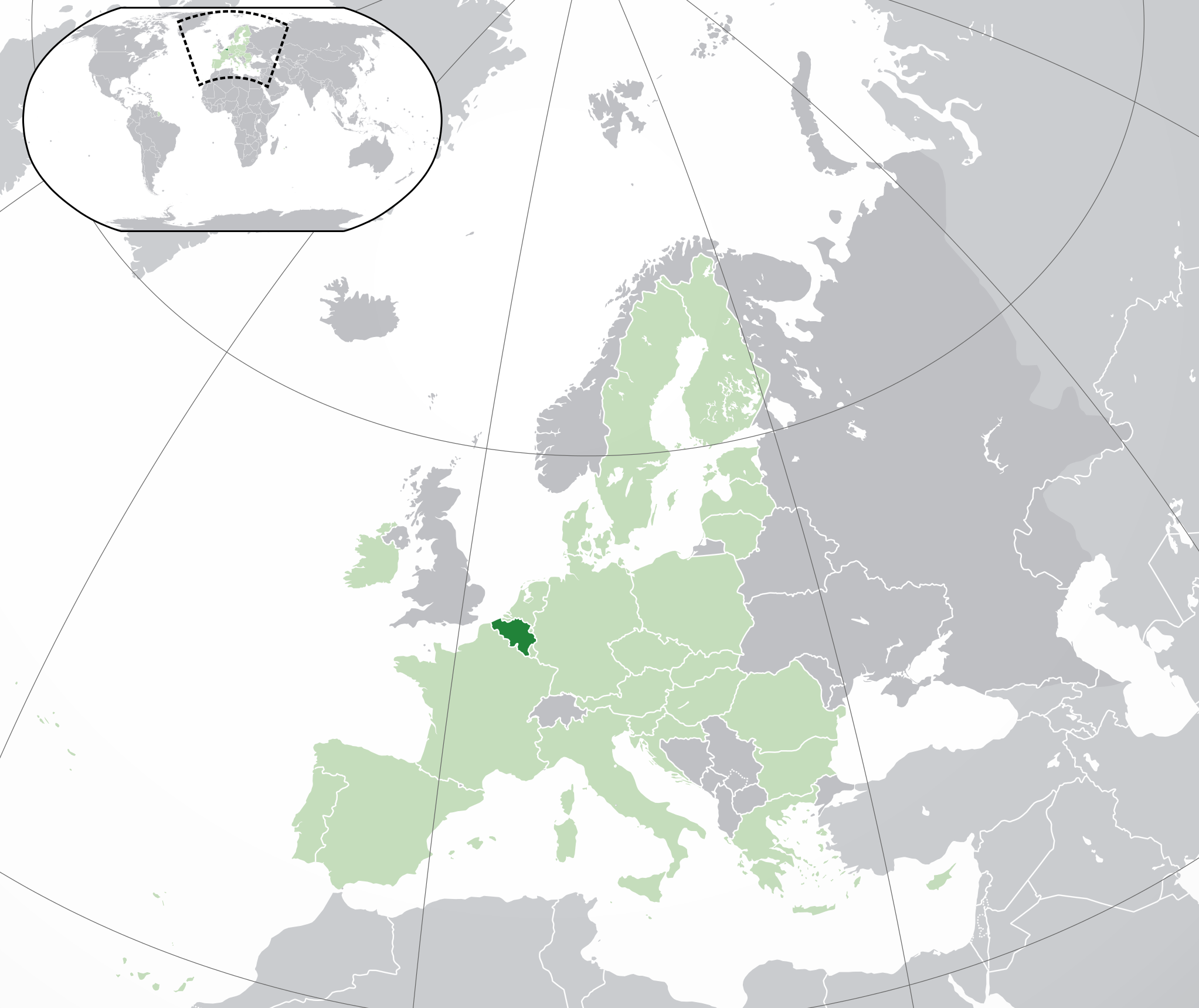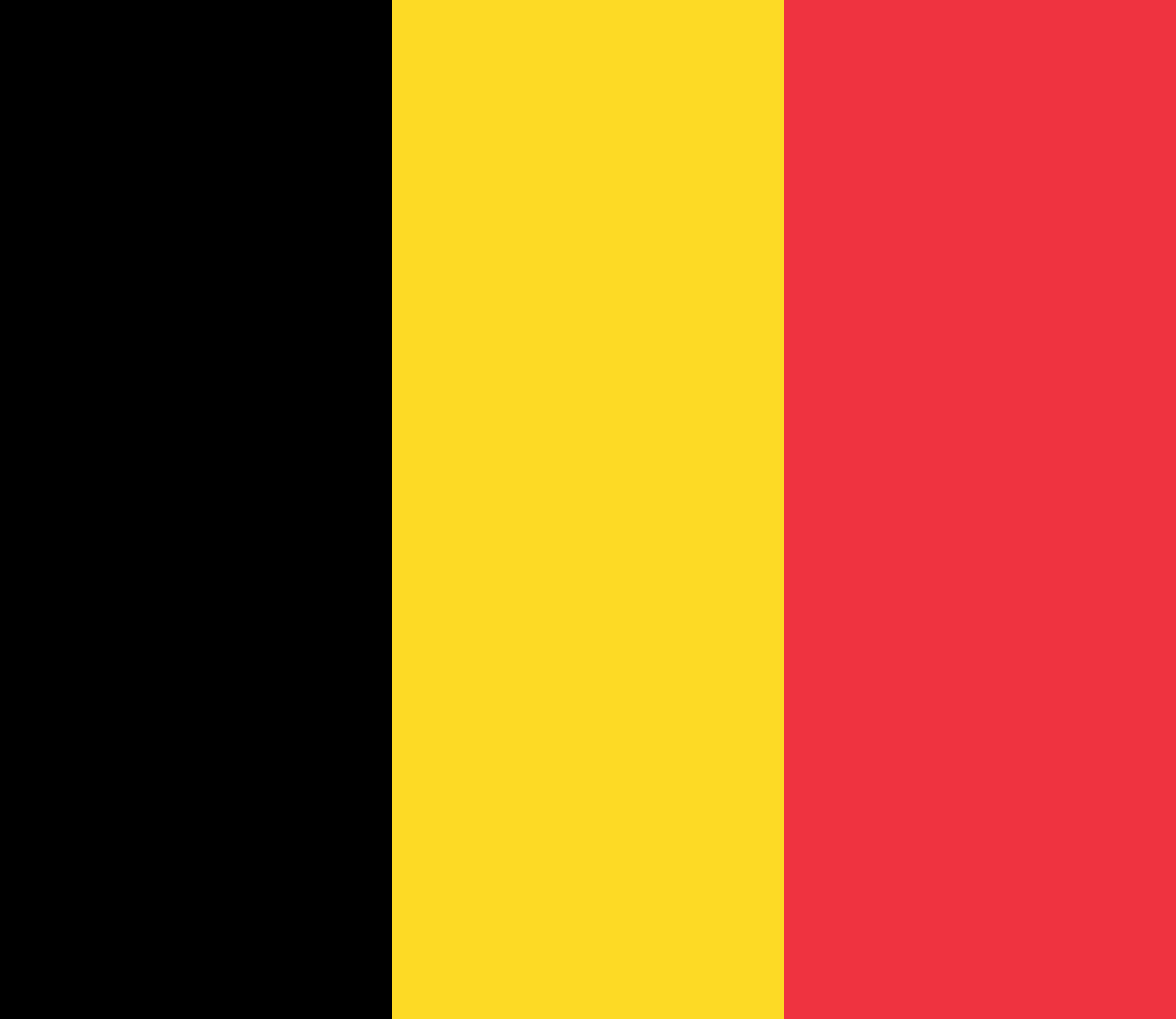More languages
More actions
No edit summary |
General-KJ (talk | contribs) (Expanded the article) Tag: Visual edit |
||
| (3 intermediate revisions by 2 users not shown) | |||
| Line 1: | Line 1: | ||
{{Infobox country|name=Kingdom of Belgium|native_name=Koninkrijk België<br>Royaume de Belgique<br>Königreich Belgien|image_flag=Belgian_flag.png|image_coat=Belgian coat of arms.svg|capital=Brussels|largest_city=Brussels|image_map=Belgium map.png|map_width= | {{Infobox country|name=Kingdom of Belgium|native_name=Koninkrijk België<br>Royaume de Belgique<br>Königreich Belgien|image_flag=Belgian_flag.png|image_coat=Belgian coat of arms.svg|capital=Brussels|largest_city=Brussels|image_map=Belgium map.png|map_width=320|official_languages=Dutch<br>French<br>German|government_type=Constitutional parliamentary monarchy|leader_title1=Monarch|leader_title2=Prime Minister|leader_name1=[[Philippe]]|leader_name2=[[Alexander de Croo]]|area_km2=30,689|population_estimate=11,697,557|population_estimate_year=2023|mode_of_production=[[Capitalism]]}} | ||
'''Belgium''', officially the '''Kingdom of Belgium''', is | '''Belgium''', officially the '''Kingdom of Belgium''', is a [[Western Europe|Western European]] country bordered by the [[Kingdom of the Netherlands|Netherlands]], [[Federal Republic of Germany|Germany]], [[Grand Duchy of Luxembourg|Luxembourg]] and [[French Republic|France]] as well as having a small coastline to the west. The country is [[Imperialism|imperialist]] and is a member of the [[European Union]] and [[NATO]], housing the headquarters for both.<ref>{{News citation|title=North Atlantic Treaty Organization|url=https://www.nato.int/|newspaper=North Atlantic Treaty Organization|archive-url=https://web.archive.org/web/20220120010607/https://www.nato.int/|archive-date=2022-01-20|retrieved=2022-01-20}}</ref> Belgium is predominately split between the Dutch speaking northern region of [[Flanders]] and the French speaking southern region of [[Wallonia]], but the lack of a distinct Belgian identity means that although Belgium is currently a country it is not a [[nation]].<ref>{{Web citation|author=Barbara Moens|newspaper=Politico|title=Why Belgium may be about to break up|date=2023-07-21|url=https://www.politico.eu/article/belgium-break-up-flanders-wallonia-tom-van-grieken-vlaams-belang-far-right/|archive-url=https://web.archive.org/web/20240330073031/https://www.politico.eu/article/belgium-break-up-flanders-wallonia-tom-van-grieken-vlaams-belang-far-right/|archive-date=2024-03-30}}</ref> | ||
== History == | |||
=== Independence === | |||
Influenced by the [[July Revolution]] in France, a [[bourgeois revolution]] began in Belgium on August 25, 1830 bringing an end to Dutch domination.<ref>{{Citation|author=E. V. Rubinin|year=1979|title=The Great Soviet Encyclopedia|title-url=https://encyclopedia2.thefreedictionary.com/Belgium|chapter=Belgium|section=Development of capitalist relations and the creation of an independent state}}</ref> Independence was declared soon after and at a conference of the great powers on December 20, 1830 Belgium's independence was recognised and "permanent neutrality" was proclaimed in January 1931. The great powers also selected a [[Monarchism|monarch]] for the new constitutional monarchy, and Prince [[Leopold I Saxe-Coburg-Gotha|Leopold]] of [[Saxe-Coburg]] was selected making him King Leopold I of Belgium.<ref>{{Citation|author=E. V. Rubinin|year=1979|title=The Great Soviet Encyclopedia|title-url=https://encyclopedia2.thefreedictionary.com/Belgium|chapter=Belgium|section=From 1830 to the end of the 19th century}}</ref> | |||
=== World Wars === | |||
When [[German Reich (1933–1945)|Nazi Germany]] invaded Belgium in 1940, most of the Belgian [[bourgeoisie]] supported them as did future Prime Minister [[Achille Van Acker]] and [[Belgian Labour Party]] (POB-BWP) leader [[Hendrik de Man]].<ref name=":022332">{{Citation|author=Ludo Martens|year=1996|title=Another View of Stalin|chapter=The Great Purge|isbn=9782872620814|publisher=Editions EPO|pdf=https://gateway.ipfs.io/ipfs/bafykbzaceab64vxtxpqt2cdl4zsrsftmedqidn4foq74gr25qkd35z5nwogdi?filename=Ludo%20Martens%20-%20Another%20View%20of%20Stalin-Editions%20EPO%20%281996%29.pdf|page=170–171}}</ref> | |||
== Colonialism == | == Colonialism == | ||
King [[Leopold II]] of Belgium colonized and personally ruled the [[Congo-Kinshasa|Congo]] from 1885 to 1908. Leopold killed over 10 million Africans and became one of the richest people in the world through rubber and ivory. Colonial authorities routinely cut off hands, legs, and ears of Africans. In 1908, control of the Congo switched from the Belgian king to the Belgian government. Belgium used its wealth from the Congo to pay for the [[Second World War]] and ended the war with no debt.<ref>{{Web citation|author=Luwezi Kinshasa|newspaper=[[The Burning Spear]]|title=King Leopold II, king of genocide: Make Belgium pay reparations!|date=2020-09-09|url=https://www.theburningspear.com/2020/09/King-Leopold-II-king-of-genocide-Make-Belgium-pay-reparations|archive-url=https://web.archive.org/web/20220316071827/https://www.theburningspear.com/2020/09/King-Leopold-II-king-of-genocide-Make-Belgium-pay-reparations|archive-date=2022-03-16|retrieved=2022-08-27}}</ref> | King [[Leopold II]] of Belgium colonized and personally ruled the [[Congo-Kinshasa|Congo]] from 1885 to 1908. Leopold killed over 10 million Africans and became one of the richest people in the world through rubber and ivory. Colonial authorities routinely cut off hands, legs, and ears of Africans. In 1908, control of the Congo switched from the Belgian king to the Belgian government. Belgium used its wealth from the Congo to pay for the [[Second World War]] and ended the war with no debt.<ref>{{Web citation|author=Luwezi Kinshasa|newspaper=[[The Burning Spear]]|title=King Leopold II, king of genocide: Make Belgium pay reparations!|date=2020-09-09|url=https://www.theburningspear.com/2020/09/King-Leopold-II-king-of-genocide-Make-Belgium-pay-reparations|archive-url=https://web.archive.org/web/20220316071827/https://www.theburningspear.com/2020/09/King-Leopold-II-king-of-genocide-Make-Belgium-pay-reparations|archive-date=2022-03-16|retrieved=2022-08-27}}</ref> | ||
In 1960, Belgium helped the dictator [[Mobutu Sese Seko]] come to power in the [[Democratic Republic of the Congo]], one of its former colonies.<ref>{{News citation|date=2001-11-16|title=Belgium link in Lumumba death|url=http://news.bbc.co.uk/2/hi/africa/1660615.stm|newspaper=[[BBC]]|archive-url=https://web.archive.org/web/20210613193811/http://news.bbc.co.uk/2/hi/africa/1660615.stm|archive-date=2021-06-13|retrieved=2022-01-20}}</ref> | In 1960, Belgium helped the dictator [[Mobutu Sese Seko]] come to power in the [[Democratic Republic of the Congo]], one of its former colonies.<ref>{{News citation|date=2001-11-16|title=Belgium link in Lumumba death|url=http://news.bbc.co.uk/2/hi/africa/1660615.stm|newspaper=[[BBC]]|archive-url=https://web.archive.org/web/20210613193811/http://news.bbc.co.uk/2/hi/africa/1660615.stm|archive-date=2021-06-13|retrieved=2022-01-20}}</ref> In 2002, it admitted that it helped Mobutu assassinate Prime Minister [[Patrice Lumumba]].<ref name=":1222">{{Citation|author=[[Vijay Prashad]]|year=2008|title=The Darker Nations: A People's History of the Third World|chapter=Notes|page=285|pdf=https://cloudflare-ipfs.com/ipfs/bafykbzaceascnzh26r5d6uitjjs2z7rflhaxlt7rboz5whzdf76qg6xxvecqq?filename=%28A%20New%20Press%20People%27s%20history%29%20Vijay%20Prashad%20-%20The%20darker%20nations_%20a%20people%27s%20history%20of%20the%20third%20world-The%20New%20Press%20%282008%29.pdf|publisher=The New Press|isbn=9781595583420|lg=https://libgen.rs/book/index.php?md5=9B40B96E830128A7FE0E0E887C06829F}}</ref> | ||
== Politics == | == Politics == | ||
The [[Far-right politics|far-right]] parties [[Flemish Interest]] and [[New Flemish Alliance]] want | The [[Far-right politics|far-right]] parties [[Flemish Interest]] and [[New Flemish Alliance]] want Flanders to secede from Belgium. Flemish Interest received 18.46% of the vote in the Flemish regional elections and is a member of the [[Identity & Democracy]] bloc in the [[European Union|EU]].<ref>{{Web citation|author=Ellen Rivera, Marsha P. Davis|newspaper=[[CovertAction Magazine]]|title=Dissecting Identity & Democracy: the EU’s new far-right super group|date=2019-07-22|url=https://covertactionmagazine.com/2019/07/22/dissecting-identity-democracy-the-eus-new-far-right-super-group/|archive-url=https://web.archive.org/web/20200921200918/https://covertactionmagazine.com/2019/07/22/dissecting-identity-democracy-the-eus-new-far-right-super-group/|archive-date=2020-09-21|retrieved=2022-11-23}}</ref> | ||
== References == | == References == | ||
[[Category:Countries]] | [[Category:Countries]] | ||
[[Category:European countries]] | |||
[[Category:Imperialist countries]] | [[Category:Imperialist countries]] | ||
<references /> | <references /> | ||
[[Category:Global north]] | [[Category:Global north]] | ||
Latest revision as of 19:15, 22 May 2024
| Kingdom of Belgium Koninkrijk België Royaume de Belgique Königreich Belgien | |
|---|---|
 | |
| Capital and largest city | Brussels |
| Official languages | Dutch French German |
| Dominant mode of production | Capitalism |
| Government | Constitutional parliamentary monarchy |
• Monarch | Philippe |
• Prime Minister | Alexander de Croo |
| Area | |
• Total | 30,689 km² |
| Population | |
• 2023 estimate | 11,697,557 |
Belgium, officially the Kingdom of Belgium, is a Western European country bordered by the Netherlands, Germany, Luxembourg and France as well as having a small coastline to the west. The country is imperialist and is a member of the European Union and NATO, housing the headquarters for both.[1] Belgium is predominately split between the Dutch speaking northern region of Flanders and the French speaking southern region of Wallonia, but the lack of a distinct Belgian identity means that although Belgium is currently a country it is not a nation.[2]
History[edit | edit source]
Independence[edit | edit source]
Influenced by the July Revolution in France, a bourgeois revolution began in Belgium on August 25, 1830 bringing an end to Dutch domination.[3] Independence was declared soon after and at a conference of the great powers on December 20, 1830 Belgium's independence was recognised and "permanent neutrality" was proclaimed in January 1931. The great powers also selected a monarch for the new constitutional monarchy, and Prince Leopold of Saxe-Coburg was selected making him King Leopold I of Belgium.[4]
World Wars[edit | edit source]
When Nazi Germany invaded Belgium in 1940, most of the Belgian bourgeoisie supported them as did future Prime Minister Achille Van Acker and Belgian Labour Party (POB-BWP) leader Hendrik de Man.[5]
Colonialism[edit | edit source]
King Leopold II of Belgium colonized and personally ruled the Congo from 1885 to 1908. Leopold killed over 10 million Africans and became one of the richest people in the world through rubber and ivory. Colonial authorities routinely cut off hands, legs, and ears of Africans. In 1908, control of the Congo switched from the Belgian king to the Belgian government. Belgium used its wealth from the Congo to pay for the Second World War and ended the war with no debt.[6]
In 1960, Belgium helped the dictator Mobutu Sese Seko come to power in the Democratic Republic of the Congo, one of its former colonies.[7] In 2002, it admitted that it helped Mobutu assassinate Prime Minister Patrice Lumumba.[8]
Politics[edit | edit source]
The far-right parties Flemish Interest and New Flemish Alliance want Flanders to secede from Belgium. Flemish Interest received 18.46% of the vote in the Flemish regional elections and is a member of the Identity & Democracy bloc in the EU.[9]
References[edit | edit source]
- ↑ "North Atlantic Treaty Organization". North Atlantic Treaty Organization. Archived from the original on 2022-01-20. Retrieved 2022-01-20.
- ↑ Barbara Moens (2023-07-21). "Why Belgium may be about to break up" Politico. Archived from the original on 2024-03-30.
- ↑ E. V. Rubinin (1979). The Great Soviet Encyclopedia: 'Belgium; Development of capitalist relations and the creation of an independent state'.
- ↑ E. V. Rubinin (1979). The Great Soviet Encyclopedia: 'Belgium; From 1830 to the end of the 19th century'.
- ↑ Ludo Martens (1996). Another View of Stalin: 'The Great Purge' (pp. 170–171). [PDF] Editions EPO. ISBN 9782872620814
- ↑ Luwezi Kinshasa (2020-09-09). "King Leopold II, king of genocide: Make Belgium pay reparations!" The Burning Spear. Archived from the original on 2022-03-16. Retrieved 2022-08-27.
- ↑ "Belgium link in Lumumba death" (2001-11-16). BBC. Archived from the original on 2021-06-13. Retrieved 2022-01-20.
- ↑ Vijay Prashad (2008). The Darker Nations: A People's History of the Third World: 'Notes' (p. 285). [PDF] The New Press. ISBN 9781595583420 [LG]
- ↑ Ellen Rivera, Marsha P. Davis (2019-07-22). "Dissecting Identity & Democracy: the EU’s new far-right super group" CovertAction Magazine. Archived from the original on 2020-09-21. Retrieved 2022-11-23.


